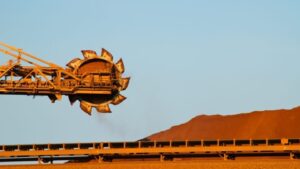Shareholders in Australian gas giants Woodside and Santos will vote on Thursday on whether they are happy with the companies’ plans to ramp up gas production over the next decade – plans activist group Market Forces says are wildly incompatible with the Paris Agreement goals.
The group, an offshoot of Friends of the Earth, has drawn up shareholder resolutions that, if successful, would force each company to provide detailed plans on how it will reduce production so it is in line with the Paris goal of keeping global warming well below 2 degrees and as close to 1.5 degrees as possible – a target each company has said it is committed to.
Oil and gas company Oil Search is also facing the same resolution at its annual general meeting later in the month.
Market Forces says on their current trajectory, all three companies are way off, and it has some pretty compelling figures to back that up.
According the United Nations-sponsored Production Gap Report, under the more ambitious 1.5ºC scenario fossil fuel production must decline by 7 per cent a year from now on.
For oil, that means a 4 per cent reduction per year, and for gas it means a 3 per cent reduction (coal, as the most carbon heavy fossil fuel, must do more of the heavy lifting). That would translate as a steady reduction to net zero by 2050.

But the three companies are planning substantial increases in production over the next decade: Santos by 103.7 per cent by 2026 on 2018 levels; Oil Search by 80 per cent by 2030 on 2020 levels; and Woodside by 70 per cent by 2028 on 2019 levels.
Market Forces says the companies are justifying these targets based on demand projections by 2035 that are 38 per cent higher than the International Energy Agency’s Sustainable Development Scenario, which would lead to warming of around 1.65ºC.
“In fact,” says Market Forces in its explanatory note to investors, “each company is planning to increase production at rates that exceed even the IEA’s ‘STEPS’ scenario, which is matched to a 2.7ºC warming outcome.
“In other words, the companies’ business strategies are consistent with the failure of the Paris Agreement, entailing significant stranded asset risk.”
Warming that approaches 3ºC is considered too dangerous to even contemplate as an acceptable target.

To be fair to the companies, these large increases could theoretically be followed by dramatic falls in the years after the targets and still be consistent with science-based carbon budgets. But it’s hard to see how, on the face of it, that scenario would be in keeping with the orderly transition to net zero promoted by most plausible economic institutions, including the Reserve Bank of Australia.
That’s why Market Forces wants more disclosure. If Woodside, Santos and Oil Search do have credible plans to stay in step with the Paris goals, they should disclose them in detail. Because on current trajectories it looks like their support of Paris goals and meagre carbon offsetting programs are little more than lip service. As RenewEconomy has previously reported, Woodside’s much-publicised tree planting program, though undeniably large in scale, is a drop in the ocean next to its huge scope 3 emissions.
Woodside and Santos have given some ground to investor pressure. The two companies were also facing shareholder resolutions filed by the Australian Centre for Corporate Responsibility calling on them to put their climate reports up for vote. That would give shareholders a direct say in whether they considered the companies’ climate strategies acceptable.
The resolutions were withdrawn last month after the companies agreed to put the climate plans up for vote at their 2022 AGMs.
So, will the votes succeed?
Both Woodside and Santos have their annual shareholder meetings tomorrow (Thursday 15 April), when the vote will take place. Market Forces campaigner Will Van der Pol said he believed at least one of the major proxy voters was backing the resolution (proxy voters are bodies that vote on behalf of shareholders that don’t have the time, resources or will to vote themselves). But he said another major one was opposing it, meaning the chances of getting the necessary numbers don’t look great.
Market Forces is appealing to shareholders with the “orderly transition” argument. Unlike diverse resources companies like BHP, which has a clear future mining the many minerals that will remain vital in a net zero world, it is hard to see any long-term role at all in a zero-carbon world for pure play oil and gas companies like these three companies.
It says that key exports markets Japan, China and South Korea all have net zero targets, and so ramping up gas production increases the risk of creating stranded assets. As demand shrinks, Market Forces argues competing LNG exporters Qatar and Russia will be in a stronger position than Australian producers because they have a lower costs.
This is a point echoed in a new report by the Institute for Energy Economics and Financial Analysis (IEEFA), which argues Qatar’s break even cost of $4 per million British thermal units is far below Australia’s, which is more than $5.
It quotes figures by Wood Mackenzie that find gas produced by Woodside’s Pluto expansion project will be over $9 per MMBtu.
It also points out Qatar is massively ramping up gas production from 77 million tonnes a year today to 110 million tonnes a year by 2025.

“Qatar is a very low cost producer and can comfortably afford to employ greenhouse gas emission reductions while cutting the price of LNG,” said the IEEFA report’s author Bruce Robertson.
“Meanwhile, the financial implications of Woodside’s emissions are unknown.
“This increasing competition from Qatar puts even greater pressure on the economics of the Scarborough gas field and Pluto LNG expansion. Woodside is keeping its investors in the dark regarding the financial effects of its greenhouse emissions. It should be compelled to publish its financial modelling.”









